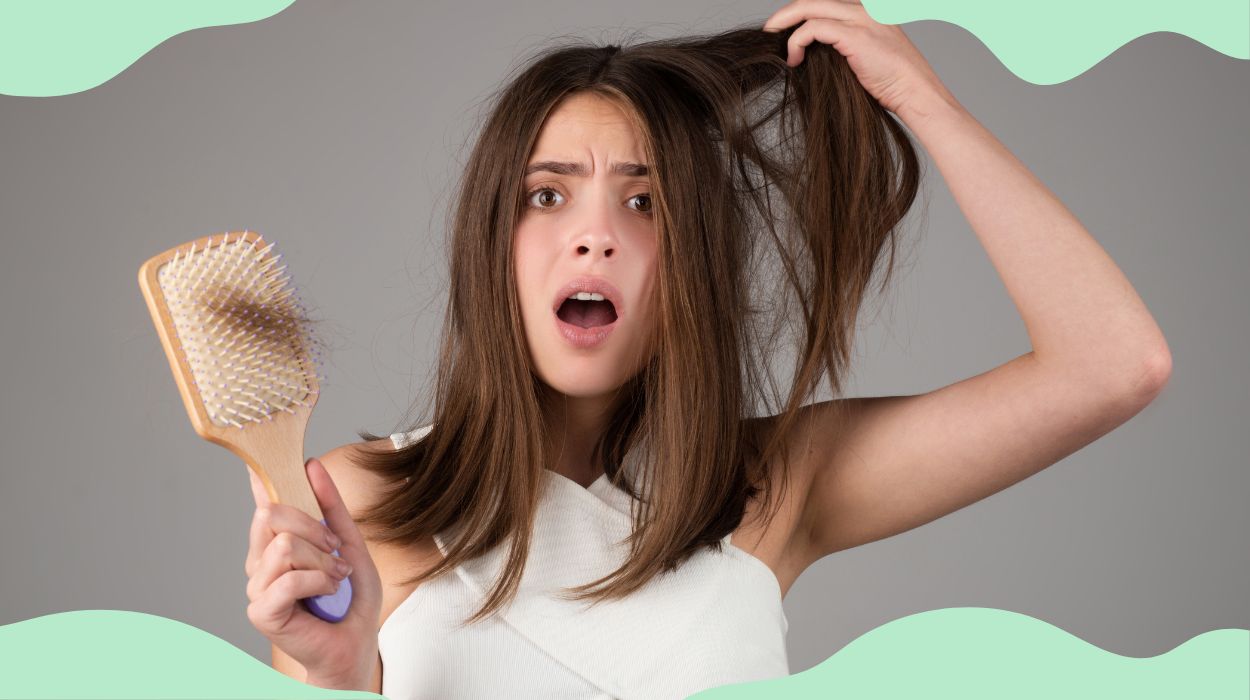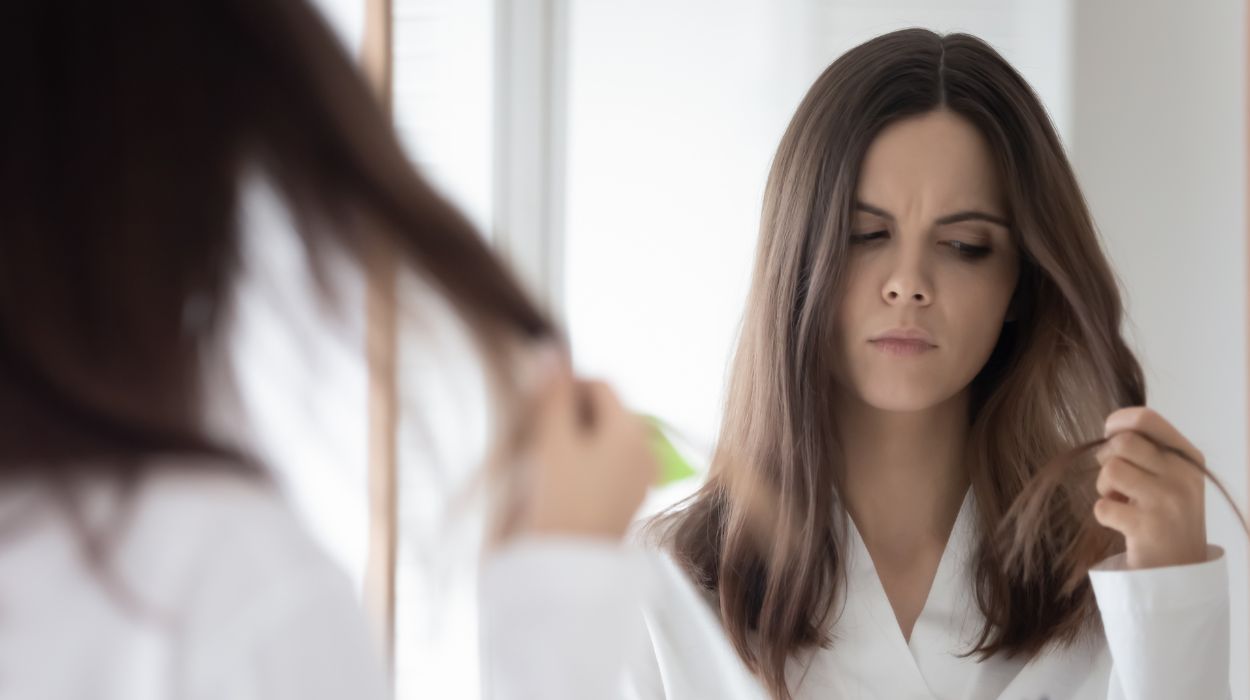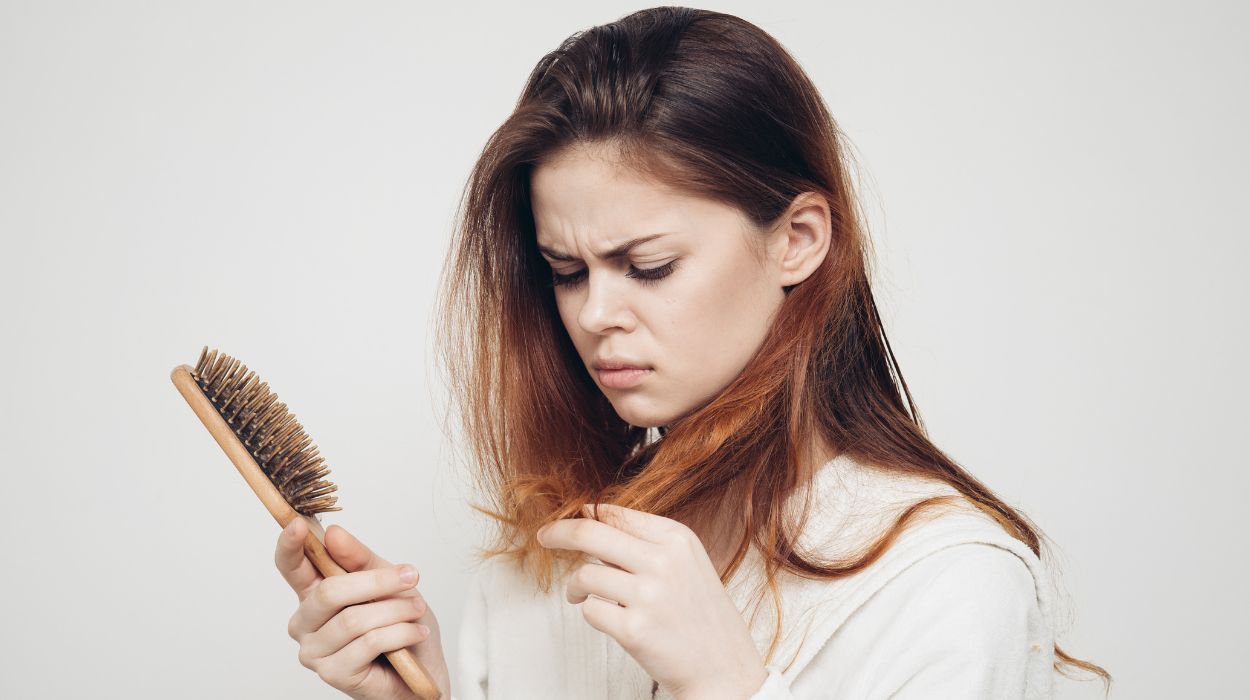 Evidence Based
Evidence Based
Evidence Based
This article is objectively based on relevant scientific literature, written by experienced medical writers, and fact-checked by a team of degreed medical experts.
Our team of registered dietitian nutritionists and licensed medical professionals seek to remain objective and unbiased while preserving the integrity of any scientific debate.
The articles contain evidence-based references from approved scientific sites. The numbers* in parentheses (*1,2,3) will take you to clickable links to our reputable sources.
Hair Loss Due To Stress And Anxiety: Are They Related?

Have you ever noticed a sudden increase in hair shedding during periods of intense stress or anxiety? While hair loss can stem from various factors, anxiety and stress have been identified as potential contributors. The connection between these psychological states and hair loss is a complex one, involving disrupted hair growth cycles and imbalances in hormones like cortisol, the stress hormone.
Understanding this link is crucial for hair loss due to stress and anxiety treatment. In this article, we explore the different types of anxiety-related hair loss, delve into the treatments available, and provide practical tips to help minimize hair loss caused by anxiety and stress. By addressing anxiety and stress, you can not only promote hair health but also enhance your overall well-being. Keep reading to find out all about the link between anxiety and hair loss!
Can Anxiety And Stress Cause Hair Loss?
Anxiety and stress can cause hair loss. Managing anxiety and stress is key to addressing hair loss associated with anxiety. Techniques such as cognitive-behavioral therapy, relaxation exercises, mindfulness, and stress management strategies can help reduce anxiety levels. Additionally, adopting a healthy lifestyle, including regular exercise, a balanced diet, and adequate sleep, can contribute to overall well-being and promote healthy hair growth. To learn more about foods that can cause hair loss, check out this article!
The Link Between Anxiety And Hair Loss

The link between anxiety and hair loss is a complex and multifaceted topic. While it is normal to shed some hair on a daily basis, excessive hair loss can be distressing and may have various underlying causes, one of which can be anxiety.
Stress and anxiety can disrupt the normal hair growth cycle, leading to a condition known as telogen effluvium. Telogen effluvium[1] occurs when a large number of hair follicles prematurely enter the resting (telogen) phase of the hair growth cycle, resulting in increased shedding and thinning of the hair. This condition is usually temporary and reversible once the underlying stress or anxiety is addressed.
The exact mechanisms by which anxiety contributes to hair loss are not fully understood, but several factors are believed to play a role. Chronic anxiety or an anxiety disorder can disrupt the balance of hormones in the body, specifically cortisol[2], which is known as the stress hormone. Elevated cortisol levels can impact the hair growth cycle and lead to hair loss.
Moreover, anxiety can trigger behaviors that can contribute to hair loss. For instance, individuals experiencing anxiety may engage in compulsive behaviors like hair pulling (trichotillomania[3]) or excessive hair rubbing or twisting, leading to hair breakage and damage.
It is important to note that hair loss can also be influenced by other factors, such as genetics, hormonal imbalances, nutritional deficiencies, and certain medical conditions. Therefore, it is crucial to consult a healthcare professional or a dermatologist to determine the exact cause of hair loss and develop an appropriate treatment plan. Read about more ways to stop hair loss in this article!
While the link between anxiety and hair loss is evident, it is important to consider a holistic approach when addressing hair loss. By managing anxiety effectively and seeking professional advice, individuals can take steps towards promoting hair health and overall well-being.
Types Of Hair Loss Due To Anxiety

Anxiety can contribute to various types of hair loss, and understanding these types can help individuals recognize and address their specific concerns. Here are some common types of hair loss associated with anxiety:
Telogen Effluvium
This is one of the most common forms of hair loss related to anxiety. It occurs when a large number of hair follicles enter the resting phase (telogen) prematurely, leading to excessive shedding and thinning of the hair. Telogen effluvium is usually temporary, and hair growth resumes once the underlying stress or anxiety is managed.
Trichotillomania
This is a psychological disorder characterized by an irresistible urge to pull out one’s own hair. The act of hair pulling can provide temporary relief from anxiety but often results in noticeable hair loss. Trichotillomania may require a combination of therapy, behavioral interventions, and support to address the underlying anxiety and break the hair-pulling habit.
Alopecia Areata
Although the exact cause of alopecia areata[4] is not fully understood, it is believed to be an autoimmune condition triggered by stress and anxiety. It results in patchy hair loss on the scalp or other areas of the body. Managing stress and anxiety, along with medical interventions, can help treat alopecia areata.
Stress-Induced Hair Breakage
Persistent anxiety and stress can lead to hair breakage. Individuals may excessively rub, twist, or pull at their hair due to anxiety-related behaviors, resulting in weakened hair strands that break easily. Protecting the hair from excessive manipulation and practicing stress management techniques can help prevent further damage.
Traction Alopecia
Traction alopecia[5] occurs when constant tension or pulling on the hair causes damage to the hair follicles. Anxiety-related behaviors like tight hairstyles, ponytails, or braids can contribute to this type of hair loss. Avoiding hairstyles that strain the hair and allowing the scalp and hair follicles to rest can help in managing traction alopecia.
Treatments For Anxiety Hair Loss
When addressing hair loss due to stress and anxiety treatment, it is essential to focus on managing the underlying anxiety itself. By effectively managing anxiety, individuals can potentially reduce or halt the hair loss associated with it. Here are some treatment options for anxiety-related hair loss:
- Stress Management Techniques: Learning and practicing stress management techniques can significantly help in reducing anxiety levels. Techniques such as deep breathing exercises, meditation, yoga, and mindfulness can promote relaxation and reduce the impact of anxiety on hair loss. Read about breathing exercises that can help with anxiety!
- Medications: In some cases, medications may be prescribed to manage anxiety symptoms. Antidepressants, anti-anxiety medications, or beta-blockers can be prescribed by a healthcare professional to help regulate anxiety and potentially reduce hair loss.
- Lifestyle Changes: Adopting a healthy lifestyle can contribute to overall well-being and potentially reduce anxiety-related hair loss. Regular exercise, a balanced diet, sufficient sleep, and avoiding alcohol and substance abuse can all positively impact anxiety levels and promote hair health.
- Scalp and Hair Care: Taking care of the scalp and hair is crucial during periods of anxiety-related hair loss. Gentle handling of hair, avoiding harsh chemical treatments, using mild shampoos, and incorporating moisturizing and nourishing hair products can help maintain the health and strength of existing hair.
- Dermatological Interventions: In certain cases, dermatological interventions may be recommended. These can include topical treatments, scalp injections, or low-level laser therapy to promote hair growth and improve hair density.
6 Tips To Reduce Hair Loss From Anxiety And Stress
Experiencing hair loss due to anxiety and stress can be distressing, but there are steps you can take to reduce its impact. Here are some hair loss due to stress and anxiety treatment tips to help minimize hair loss caused by anxiety and stress:
Practice Stress Management Techniques
Incorporate stress management techniques into your daily routine. Deep breathing exercises, meditation, yoga, or engaging in activities you enjoy can help reduce anxiety levels and promote overall well-being, potentially reducing hair loss.
Prioritize Self-Care
Make self-care a priority by taking time for activities that promote relaxation and reduce stress. This can include taking baths, practicing mindfulness, engaging in hobbies, or spending time with loved ones.
Maintain A Balanced Diet
Ensure you’re consuming a balanced diet that includes essential vitamins and minerals for hair health. Incorporate foods rich in omega-3 fatty acids, biotin, zinc, iron, and vitamin E, such as leafy greens, nuts, seeds, and fish. Collagen may also help with hair loss, read all about it here!
Get Regular Exercise
Engage in regular physical activity as it can help reduce stress and improve overall well-being. Find activities you enjoy, whether it’s walking, jogging, dancing, or yoga, and aim for at least 30 minutes of exercise most days of the week.
Practice Good Hair Care
Treat your hair gently to avoid unnecessary damage. Use a wide-toothed comb or a brush with soft bristles to detangle hair, and avoid excessive heat styling or harsh chemical treatments that can further weaken the hair.
Get Adequate Sleep
Prioritize getting enough sleep each night to allow your body and mind to rest and rejuvenate. Aim for 7-9 hours of quality sleep to support overall well-being and minimize the impact of stress on your hair.
Will Hair Loss From Anxiety Grow Back?
Hair loss caused by anxiety is not permanent in most cases. By effectively managing and treating the underlying anxiety, hair growth can be restored. Techniques such as therapy, stress reduction, and relaxation exercises can help alleviate anxiety symptoms and promote healthy hair growth.
Conclusion
In conclusion, the link between anxiety and hair loss is a complex and multifaceted one. While anxiety and stress can contribute to various types of hair loss, understanding and addressing these underlying psychological factors is crucial for promoting hair health and overall well-being.
By managing anxiety effectively through techniques like cognitive-behavioral therapy, relaxation exercises, mindfulness, and stress management strategies, individuals can reduce anxiety levels and potentially minimize hair loss. Hair loss due to stress and anxiety treatments involve adopting a healthy lifestyle, including regular exercise, a balanced diet, and sufficient sleep, further supports hair health.
Frequently Asked Questions
Anxiety and stress can disrupt the normal hair growth cycle and lead to conditions like telogen effluvium, where hair follicles enter the resting phase prematurely, causing hair falling out and thinning of the hair.
Some common types of hair loss related to anxiety include telogen effluvium, trichotillomania (hair pulling disorder), alopecia areata, stress-induced hair breakage, and traction alopecia.
When addressing hair loss due to stress and anxiety treatment, it’s important to focus on managing the underlying anxiety itself. Stress management techniques such as deep breathing exercises, meditation, and mindfulness can help reduce anxiety levels. In some cases, medications may be prescribed to manage anxiety symptoms.
Some tips to minimize losing hair caused by anxiety and stress include practicing stress management techniques like deep breathing exercises and engaging in activities that promote relaxation. Prioritizing self-care, maintaining a balanced diet rich in essential nutrients, getting regular exercise, practicing good hair care habits, and ensuring adequate sleep are also important. Collagen may be helpful in those dealing with hair loss read Viauthority reviews here!
In most cases, hair loss caused by anxiety is not permanent. By effectively managing and treating the underlying anxiety, hair growth can be restored. Techniques such as therapy, stress reduction, and relaxation exercises can help alleviate anxiety symptoms and promote healthy hair growth.
+ 5 sources
Health Canal avoids using tertiary references. We have strict sourcing guidelines and rely on peer-reviewed studies, academic researches from medical associations and institutions. To ensure the accuracy of articles in Health Canal, you can read more about the editorial process here
- Shahram Seyfi, Robabeh Alijanpour, Zeinab Aryanian, Khadijeh Ezoji and Mahmoudi, M. (2022). Prevalence of telogen effluvium hair loss in COVID-19 patients and its relationship with disease severity. [online] 15(5), pp.631–634. doi:https://doi.org/10.25122/jml-2021-0380.
- Mario Francisco Juruena, Filip Eror, Cleare, A.J. and Young, A.H. (2020). The Role of Early Life Stress in HPA Axis and Anxiety. [online] pp.141–153. doi:https://doi.org/10.1007/978-981-32-9705-0_9.
- International Journal of Psychiatry in Clinical Practice. (2017). Trichotillomania and its clinical relationship to depression and anxiety. [online] Available at: https://www.tandfonline.com/doi/abs/10.1080/13651501.2017.1314509
- NIAMS (2017). Alopecia Areata. [online] National Institute of Arthritis and Musculoskeletal and Skin Diseases. Available at: https://www.niams.nih.gov/health-topics/alopecia-areata#:~:text=Alopecia%20areata%20is%20a%20disease,affects%20the%20head%20and%20face.
- Clinical, Cosmetic and Investigational Dermatology. (2018). Traction alopecia: the root of the problem. [online] Available at: https://www.tandfonline.com/doi/full/10.2147/CCID.S137296



